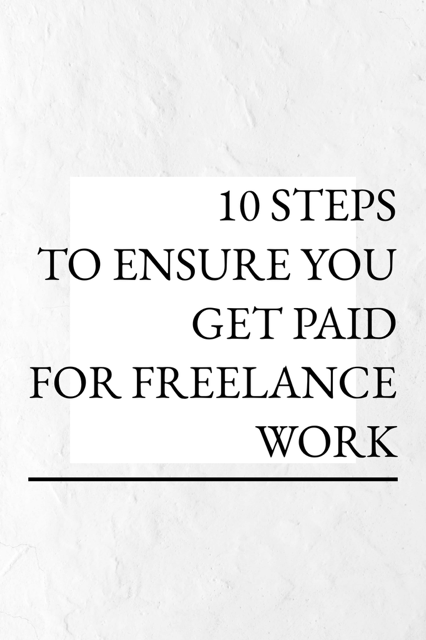
- Always do a small job for a new client first before agreeing to a large piece of work. You want to test that this is a good client to work for, including that they pay their invoices in full and on time, before you commit to a large piece of work with a new client. Also, you can ask around your network if anyone has had issues with payment from a new client.
- Where possible, get a deposit before you start work.
- Work in tranches so that payment is not held off until the end. Whether you are invoicing monthly or when certain benchmarks are met, you don’t want to do 100% of the work and then discover the client is late with paying. You have leverage to withhold further work, so don’t give this away. If it’s a longer contract, and one of your invoices hasn’t been paid, you have leverage to stay you will stop work until the invoice is paid.
- Can you be paid through credit card transaction? Having a regular billing cycle with a client through a credit card if you are doing a longer engagement might be easier for them and gives you more assurance of payment. You could also set up a shopping cart on your website where clients pre-pay for chunks of work from you. Consider how you might make this work for the work you do.
- Fulfil your obligations by making sure you deliver your work to the agreed spec and timelines. Also invoice to the agreed timings. If you can demonstrate you have fulfilled all of your obligations as a freelancer, you have greater leverage if they are not holding up their end through timely paying.
- Withhold final work until payment is made. This may not always be possible but if you can hold back some of the final intellectual property (high-resolution files, for example) until payment this gives you leverage.
- Follow all the guidelines in my previous article 5 Ways to Encourage Timely Payment of Freelance Invoices. If the payment is not made within 30 days, then reissue the invoice and mark it as ‘overdue.’ You are also entitled to add a late payment fee and interest on the invoice (this should be spelled out in your terms and conditions and clients should be told up front that this is your policy). Follow up to ensure the invoice is received and try to get confirmation in writing when it will be paid. Keep reissuing invoices every 30 days adding further late interest. This paper trail will be helpful if you have to seek legal assistance.
- Clients are people too. If payment is late, talk to them to try to understand from why the payment is not forthcoming and when payment will be made. Keep the channels of communication open and cordial as long as possible while you try to pursue your payment. Your client may be encountering some challenges and accepting more flexible payment terms are better than not being paid at all. Try to work out a payment plan and then monitor it to ensure they are complying.
- Have multiple clients. By not putting all your eggs in one basket leaves you less exposed if your client is late in paying your invoice. Don’t work exclusively for a client until you know they are reliable in paying invoices.
- If you have access to a third-party body such as the Freelancers’ Union in America or the Small Business Commissioner in the UK they can offer further advice on legal routes to pursue payment through small claims court. Note you will need to consider whether the time and cost of this is justified for the amount owed (a further reason to try to work in smaller chunks so you are never owed significant amounts of money in unpaid invoices).
Late payment is a frequent complaint for freelancers (which doesn’t mean that it is right) but non-payment is much rarer. Follow the steps above to help ensure you get the payment owed to you.
Which one will you implement first?
Leave a Reply